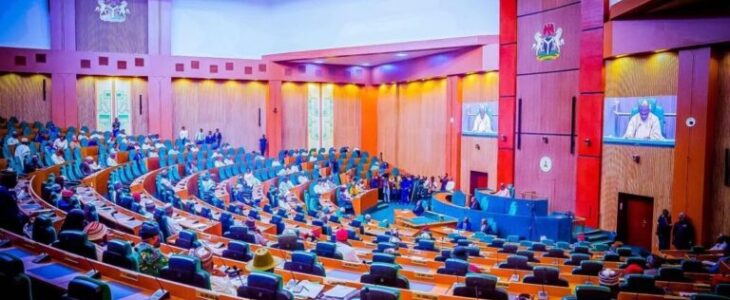
The House of Representatives has kicked against a Bill by the United States Senate, alleging the killing of Christians in Nigeria and rejected moves to designate it as a “Country of Particular Concern (CPC).”
The House, while condemning all forms of violence and persecution against any person or group on the basis of religion, rejected the narrative that the Nigeria security crisis is a religious conflict or a state sponsored persecution.

Consequently the House mandated its Committees on Foreign Affairs, National Security & Intelligence, Interior and Information, National Orientation and Values, Police Affairs, Civil Society, Human Rights to coordinate a response within 21 days.
The joint committee is expected to coordinate the Federal Ministry of Foreign Affairs and the Nigerian Embassy in Washington DC to lodge a formal diplomatic response to the sponsors of the bill as well as relevant US committees and transmit empirical data and Nigeria’s official position on the proposed legislation.

This followed the adoption of a motion on “urgent need for a coordinated diplomatic and domestic response to the proposed Nigeria Religious Freedom Accountability Act of 2025 (U.S. Senate Bill S.2747) and to mis-characterisation of Nigeria’s security and religious-freedom landscape” sponsored by the Deputy speaker, Benjamin Kalu and other members of the House.
A US senator, Ted Cruz, recently sponsored a bill titled: “Nigeria Religious Freedom Accountability Act of 2025.”
The Bill seeks the US Secretary of State to designate Nigeria a “Country of Particular Concern” (CPC) and to impose sanctions on Nigerian officials under Executive Order 13818 (Global Magnitsky) and related authorities.
The proposed legislation seeks to hold Nigerian government officials responsible for alleged murder of Christians in the country.
The Bill also requires the US secretary of state to designate Nigeria as a country of particular concern” among others.
Leading debate on the motion, Kalu explained that “on 9 September 2025 a bill titled the Nigeria Religious Freedom Accountability Act of 2025 (S.2747) was introduced in the United States Senate, seeking to require the US Secretary of State to designate Nigeria a “Country of Particular Concern” (CPC) and to impose sanctions on Nigerian officials under Executive Order 13818 (Global Magnitsky) and related authorities.”
The deputy speaker also explained that the US Commission on International Religious Freedom (USCIRF), in recent Annual Reports, recommended the country for CPC designation, pointing to “persistent violations and state failures to protect against non-state actor abuses.”
He stated that the security challenge in the country is driven by insurgency, criminal banditry, farmer-herder conflict, separatist violence and communal disputes, which affects all citizens irrespective of religious persuasion.
According to him, international reports attribute a significant share of fatalities, arising from insecurity, to terrorist groups and criminal gangs , rather than state policy.
“Nigeria’s Constitution guarantees freedom of thought, conscience and religion and bars adoption of a State religion, and that successive administrations, security agencies, faith leaders and civil society continue to undertake measures to protect all worshippers and prosecute offenders, as reflected in the U.S. Department of State’s 2023 country chapter and prior reports.”
Kalu expressed concern that “external legislative actions based on incomplete or de-contextualised assessments risk undermining Nigeria’s sovereignty, misrepresenting facts, straining strategic relations, and unintentionally emboldening violent actors.
Chairman, House Committee on Foreign Affairs, Wole Oke, in his contribution, said the Bill has already passed second reading.
Oke added that during the public hearing, the US Senate denied Nigerians and the Nigerian mission an opportunity to make presentations.
Billy Osawaru described the proposed legislation as part of “global politics”, saying that if it scales through, other African countries would be affected in no time.
Osawaru said the situation is worsened by the fact that Nigeria presently does not have an Ambassador to the US and a permanent representative in the United Nations.
“It is not enough to say we are being targeted but we must put in place a system to fight this. Nigeria does not have an ambassador in the US. If we let this scale through, Nigeria will be the first in Africa.”
The Deputy Speaker, however, reaffirmed Nigeria’s constitutional protections for freedom of religion and belief.
Contributing, the Majority Leader, Prof. Julius Ihonvhere, blamed the move by the US Senate on some Nigerians who have deliberately chosen to de-market the country.
He called on the lawmakers to ensure that such mis-informations and false narratives were dismissed by presenting facts to the US Senate.
Similarly, Wole Oke called for urgent moves to rewrite the false narratives against Nigeria and nip in the bud any move by the US to sanction Nigeria.
In the same vein, Ahmed Jaha, representing Chibok Federal Constituency of Borno State, stressed the need for the lawmakers to protect the international image of Nigeria.
Jaha, who commended the deputy speaker for moving the motion, called for amendments in the motion.
Adopting the motion, Speaker Abbas referred it to the committees on Foreign Affairs and Police for further legislative actions.
Credit: The Sun
